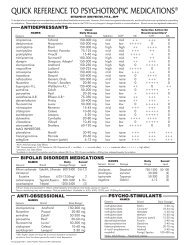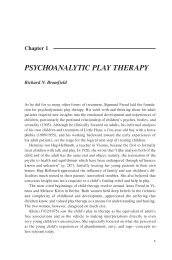IRAQ WAR CLINICIAN GUIDE
Iraq War Clinician's Guide - Network Of Care
Iraq War Clinician's Guide - Network Of Care
Create successful ePaper yourself
Turn your PDF publications into a flip-book with our unique Google optimized e-Paper software.
Iraq War Clinician Guide 181 Appendix<br />
I<br />
two extremes are a number of disease patterns. Blank" bas concluded that acute,<br />
delayed, chronic, and intermittent or recurrent forms of PTSD have been well<br />
documented. OP den Velde et aP1 described three life-suan develoomental<br />
6 -~<br />
courses among i~orld War I1 Dutch resistance fighters: a ;ubacutcform that<br />
gradually becomes chronic, a delayed form rvitll onset 5 to 35 years after the end<br />
of World War 11, and an intermittent subtype with relapses and rcmisrions.<br />
individuals who appear to have recovered conipletely from FED may relapse<br />
when sukquetrtly exposed to stimuli and situations that resemble the<br />
initial trauma. Solomon'sw studies have emphasized the vulnerability of Israeli<br />
conrbat veterans to reactivationof PTSD symptonrs if they had previously exhibited<br />
combat stress reactions. Solomon and mlleagues observed reactivation of<br />
I'TSD among asymptomatic veterans of the 1967 Yom Kippar War wlre~t reexposed<br />
to tl~e war-zone stress of the 1982 Lebanon War. An example of reactivation<br />
of PTSD among American veteransoccurred during the Persian Gulf War,<br />
!vhen there was a marked increase in PTSD symptoms anlong male and fcmale<br />
Vietnam veterans apparently in respolrse to the massive array of war-related<br />
stimuli that flooded American print and bmadcast n~ediil!*" PrSD also niay<br />
recur following life evens associated with aging, such as retire~nent!."<br />
Finally, it is worth noting that pple with PTSD often find it difficult to<br />
cope with the vicissitudes and ordinary hassles of life. Interpersonal conflicts,<br />
parenting problems, vocational setbacks, and the like may sometln~es produce<br />
reactivationor exacerbation of mSD symptoms. The niechanism for such a wellknown<br />
clinical phenomenon may be that hassle-provoked autonomic arousal<br />
precipitates trauma-related symptoms through response genenliwtion.<br />
PREVENTION<br />
Of course. the best primary prevention for war-related FED is the prevention<br />
of war. Many psychiatrists view such work as beyond their professional<br />
puwiew, although some have stated that social action is a responsibility of<br />
psychiatric professionals. For example, Friedman" has argued that from n public<br />
health perspective, pmventionof war (and other traumas) is a valid professional<br />
mncern. Another primary preventive method is to %men out wdully military<br />
recruits rvha are at greatest risk for developing PTSD.Such a strategy is unlikely<br />
to succeed for reasons outlined by Oei et aLWA.third stralegy is a psychoeducational<br />
approach to basic training that would equip new milihry recruits with<br />
tools for coping with anticipated war-zone strcssarsP 'illis could be nlled a<br />
stress inoculationapproach.<br />
Secondary preventiot~, the minimizing of long-term psychological sequelae<br />
following war-zone exposure, consists of interventions based on the treatment<br />
principles of proximity, immediacy, expectancy. and sinrplicity.*" Szlnranu list<br />
dclincated these principles during World War I, and they have proved successful<br />
in reducing the number of psychological casualties, at least in the short-term.<br />
Soldiers arc treated close to the frontline, quite soon after initial symptoms<br />
appear. Caregisws communinte the mnsage that they are having a normal arid<br />
lemporary reaction and should be able to resume their dutie alter a brief period<br />
of rest and support. They are given opporhrnities to discuss the traumatic experiences<br />
in daily group critical incident stress debriefing sessions." &cause of the<br />
principle of positive expectancy and the desire to lrormalize the soldier's responses,<br />
ppharrnacothcrapy is often avoided during frontline treatment of acute<br />
CSRs. Under appropriate conditions, i!owever, pharmacotherapy can be used<br />
effecli!:ely for recently evacuated nlilihry casi~alties!~ in a thought-provoking<br />
DEPARTMENT OF VETERANS AFFAIRS<br />
-- - -<br />
NATIONAL CENTER FOR PTSD




